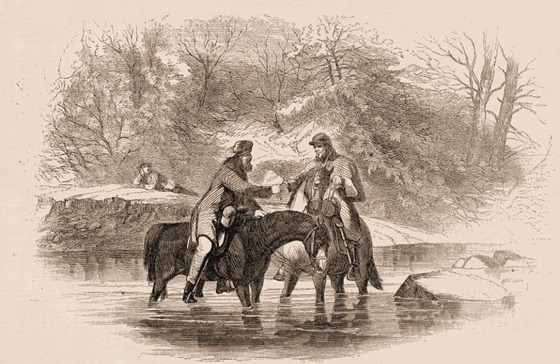January 17th [1863]. Company all day. Mrs. Roselius and a sweet little girl, who came to let us know they had a letter from Henny Davenport. She and her mother had a stormy passage across the water; had put in at Cork, but were now safe with friends at Kingston. Henny sends word that she likes Europe, but New Orleans better. She longs to see the Confederate uniform. Mrs. Davenport had a private interview a few days before she left for Europe with two gentlemen— friends of her husband. During this interview she agreed to accept from Mr. Wringlet, one of the gentlemen, a certain amount of household silver, in payment of a debt, he being at this crisis unable to give money, though worth millions. She thought, and so did the gentleman, that the interview was strictly private; their astonishment was therefore profound when General Butler sent for all three and opened up the silver subject. Mrs. Davenport, though angry enough, trotted along with Butler’s orderly. She found his Lordship walking the floor in his usual theatrical manner. The two gentlemen were summoned and accused, in brutal language, of swindling. “Do you know that these men have cheated you?” he said to Mrs. D——. “How did this happen?” he said, turning to Mr. ——. “Mind how you lie to me.” “You do not awe me by threats or such language, General Butler,” returned Mr. ——;”I lie to no man.” The precious image of brutal Judge Jeffries now stamped his foot and made his favorite threat—Fort Jackson. Mrs. D ——, trembling, said she had made a previous contract with these gentlemen and by it she was determined to abide. After more threats and much sifting he ordered the gentlemen to prison and Mrs. D —— to leave his presence. The silver had been conveyed to the vessel upon which Mrs. D —— was to sail. Butler had the hatchways broken and the silver delivered over to his tender and honest mercies. The gentlemen were ordered to raise a certain sum of money by such a time; one of them was bought off by one of his nieces. The next day the orderly was sent again for Mrs. D ——, and through a broiling sun she had again to follow him. This time she was so angry she forgot to be afraid. “Here is some money for you,” said Butler to her, pointing to $500.00, “in return for the debt out of which those men cheated you.” “I will not take it,” she said firmly; “I abide by my bargain.” “You won’t, won’t you! Here have I been to the trouble to do you justice and you don’t choose to accept of it; they tell me you are going to Europe; how well you would look now to go among your friends there with a bit of silver marked in one name and another bit in another. You are not so young, I think, that you don’t know something of business. When are you going to be off?” “On Monday, sir.” “I shall send you sooner.” “I shall go when I am ready, sir,” very firmly. “You shall go tomorrow,” stamping. “I shall go when I am ready, sir,” more firmly still. “I wish none of your impudence; you have a very long tongue of your own.” “Yes, sir, I have, but I only use it, as now, when I have occasion.” “I wish none of your impudence. Orderly, show that woman out,” and so ended the matter. The lady, being born a British subject, though long a resident here, hopes to get the silver. The matter rests with Mr. Coppel, the British-acting Consul here. Butler does as he pleases with the Consuls here and as he is a notorious thief, my private opinion is that her silver may be put down in the family account book, but it should not be counted in the family exchequer.
Mrs. Montgomery and the Judge and Mrs. Wells spent an evening with us. The Judge says we’ll have peace before spring, and though he is considered an oracle, I feel inclined to doubt him this time. Mrs. Montgomery read in an “extra” that her nephew was wounded at the late battle of Murfreesboro, and was sad in consequence. Mrs. Wells has not heard from her sweet daughters since December 4th. They left Vicksburg on account of the late attack there both by boat and land. They are still near enough to hear the cannon roar—I wish I was. The girls, Mattie and Sarah, had had their tea and other delicacies stolen. They had procured passes for them with so much trouble, too. Mrs. Wells says that she is glad of it, as they were always laughing at her locking-up system; that has been the rock upon which our household economies have split. It is so pleasant to trust; so convenient to say, “Oh, nobody will trouble it.”











